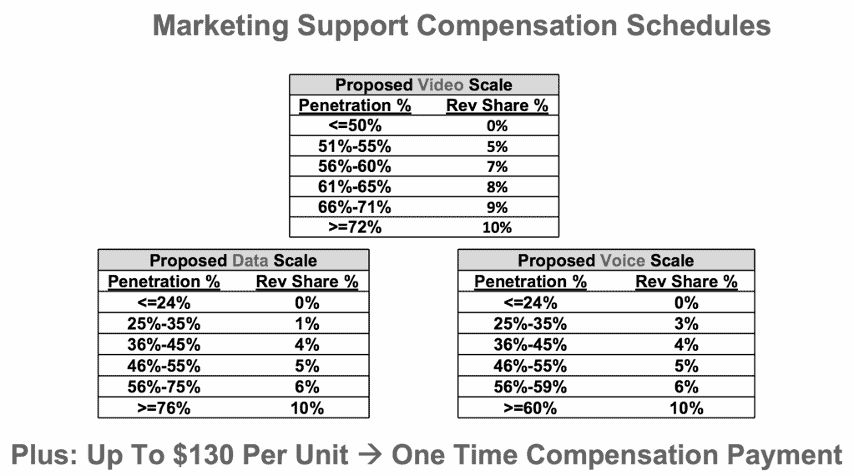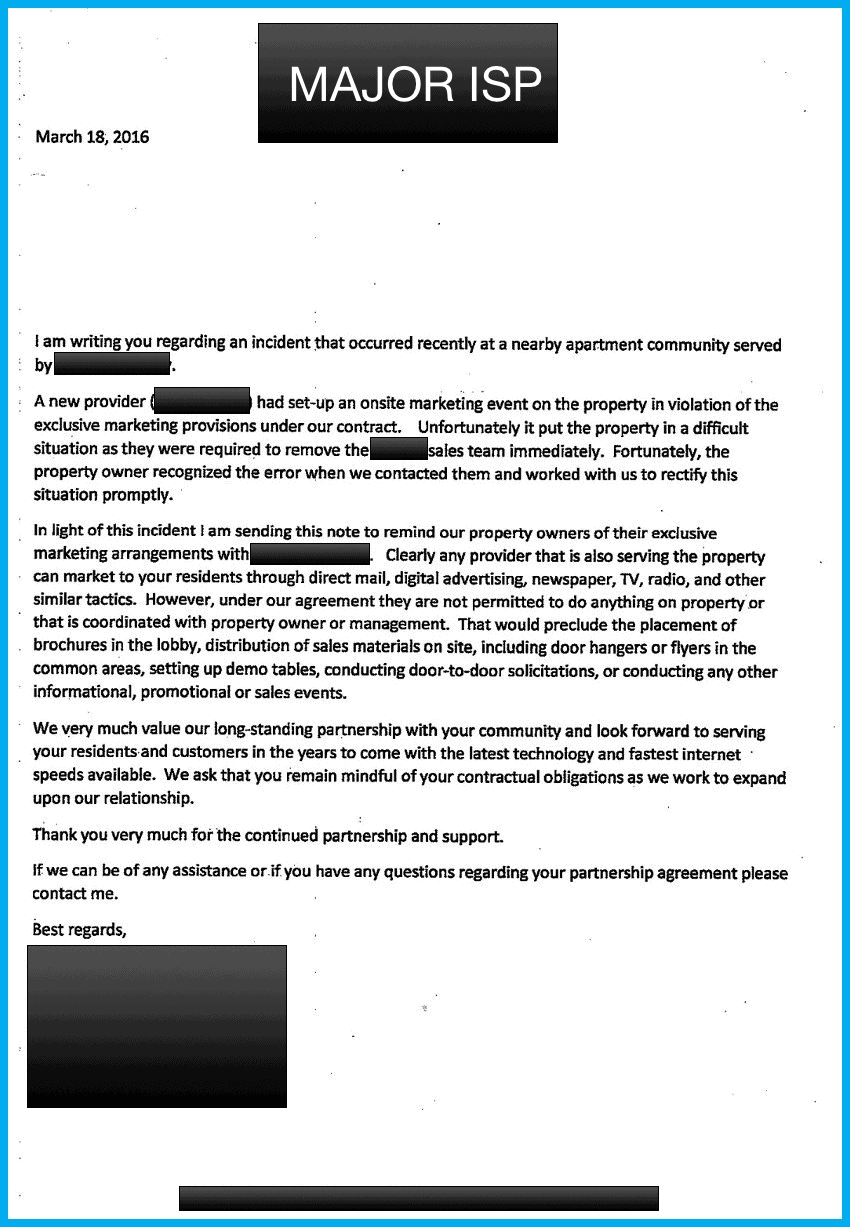How Do I Get Internet Service At A Restricted Apartment
Here'south why, and what y'all can practise about it.
Steep Cyberspace bill and no choice? If you live in an apartment building, the landlord might be profiting from your plight.
Exclusive broadband agreements betwixt apartment building owners and internet providers in cities like Los Angeles are common, leaving renters with no selection but to pay inflated costs for sub-par service — and rewarding landlords for keeping information technology that way.
The beingness of these exclusive arrangements is surprising for a simple reason: they were outlawed eight years ago .
So how are they getting away with information technology? Why are landlords getting such a big cut? And most importantly, what can renters do about information technology?
How landlords get their cut of your broadband neb
Earlier the Federal Communications Committee (FCC) outlawed them in 2008, revenue shares and long-term contracts between ISPs and MDUs (Multiple Abode Units) were perfectly legal. They were even advertised openly on visitor websites .
Current regulation may end ISPs from creating exclusive contracts — but it doesn't stop MDU owners from controlling who tin can enter to install wiring. Every bit a consequence, landlords can sneak around the law by simply shutting the door when a competing ISP comes knocking.
…And you can bet your bottom dollar the Isp they exercise allow in is paying for the privilege.
Types of exclusive agreements

Apartment building Internet monopolies come in three flavors:
1. Door fees
Door fees are exactly what they sound similar: arrangements where a building possessor charges fees to enter the building.
Door fees generally have the form of acquirement shares, only flat rates for access are also mutual — and more than sufficient to deter competing ISPs from inbound the premise. In an interview with Crain's, Shrihari Pandit of Stealth Communications reported that building owners in Manhattan often charge in the thousands per month:
We're not cut into the building, not drilling, just using existing conduit, simply they desire to accuse us $1,500 a month to bring in this tiny cable .
2. Revenue shares

Revenue share arrangements are also straightforward (if not strictly legal): an Internet service provider offers building owners a per centum of acquirement from subscribers in their building. The more subscribers, the higher the share — incentivizing landlords to work against competing ISPs and prevent renters from gaining bargaining power.
3. Exclusive advert agreements
Ever left your apartment to find complimentary donuts and java in the vestibule, or find pamphlets advertising special offers from a competing ISP on the doormat? If not, it may be because your landlord keeps them out. Sure, sectional service agreements are legally iffy. Exclusive advertizing agreements, on the other paw, are perfectly legal.
As a result, competing ISPs are out of luck if they want to knock on your door and offer a better deal. Take this alphabetic character, for case, delivered to a building possessor who violated their sectional advertising agreement with a major Internet service provider:

Helpful resources: FCC Regulation that affects Internet admission for apartment renters
- FCC regulation forbidding exclusive contracts
- FCC regulation governing inside wiring

The inside wiring problem: who owns the "pipe" that delivers Internet?
At the heart of all this legal trickery is a single object: the wire that connects your apartment to the Internet.
Inside wiring is expensive to install, and the authorities isn't exactly jumping to foot the bill for universal, shared public infrastructure. The FCC is stuck trying to regulate who has what rights when information technology comes to installing, using, and removing these wires.
Unfortunately, the laws are riddled with interesting loopholes.

Get-go off, the regulations outset to fall off when the within wiring isn't technically owned by the Internet access provider:
The provisions do not utilize where the cable home wiring belongs to the subscriber, such as where the operator has transferred ownership to the subscriber, the operator has been treating the wiring as belonging to the subscriber for tax purposes, or the wiring is considered to exist a fixture by state or local law in the subscriber's jurisdiction.
…Second, passing that ownership from renter to building owner is no trouble:
The MDU owner shall be permitted to do the rights of individual subscribers nether this subsection for purposes of the disposition of the cable home wiring nether § 76.802.
Basically, whoever owns the cables calls the shots on entry and installation — and manipulating who owns the cables is straightforward. In one case the landlord has the wires, they can merely gear up upwards an exclusive license back to the Internet service provider .
It's really kind of bright.
Exclusive broadband deals impede fair market competition

Consumers aren't but ones hurt by all this — smaller ISPs as well feel the burn. Hither's Charles Barr of Webpass (an Internet service provider recently acquired by Google Cobweb) in an interview with Professor Susan Crawford:
The FCC's rule is nonsensical. They're maxim you can't take sectional agreements, simply, at the aforementioned time, a landlord gets to say yes or no to anyone coming into the edifice, and you have to have the landlord'south permission. So, a landlord certainly tin can sign an agreement with one visitor and say 'No' to everybody else, thereby creating an sectional understanding. So that's what they do. They're under no obligation to let anybody in, and then they'll extract a rent payment from one provider.
Broadband expansion in urban areas volition be bedridden until this problem is solved. In the meantime, small ISPs are stuck in their current positions as niche providers in predominantly rural areas.
In a roundabout way, even the landlords are losing money to exclusive broadband agreements. Competitive broadband options are shown to raise rent value perception as much every bit 8%. Consumer surveys conducted as recently as June 2016 establish fast, reliable broadband to be the single virtually important amenity for apartment dwellers . Some other study found that gigabit fiber connections tin push button rent profits fifty-fifty higher, up to xi% .
Long story short, many landlords could hands profit past ending their de facto sectional agreements and encouraging broadband competition. Tragically, defoliation nearly how broadband works combined with the difficulty of wading through dumbo FCC regulation means cipher is likely to change — unless consumer demands, regulation, or increased competition footstep in to set it.
Who should own inside wiring?
The journey betwixt your cable jack and the base of operations of your edifice may exist short, just it's a route lined with legislative failure.

Like all broadband problems, the story isn't entirely blackness and white.
ISPs have a legitimate merits to the wires, since they paid up front end to have them installed. Why should another Internet service provider be able to "piggyback" on their network?
Landlords, meanwhile, take a legitimate right to stop individual companies from meddling with their buildings. Why should any company offer internet be allowed to enter the building and make alterations like drilling in wires, poking holes in floors, etc.?
Renters have a legitimate right to internet at a off-white price, regardless of who "owns" the wires, since it's classified as a utility like h2o or electricity. Abode Internet admission is increasingly essential to quality of life and equal opportunity , rather than a luxury like tv.

Internet infrastructure — a hodgepodge of private and public fiber networks hooked up to re-used telly and phone networks — isn't ideal for everyone. Short of government-funded neutral infrastructure, it's difficult to imagine a "perfect" situation that serves ISPs, landlords, and renters equally.
Here's what consumers can practice to protect their interests:
The complex legality surrounding Internet access makes going to court costly and risky for renters. Courtroom cases against landlords manufacturing monopolies have been successful in the by , merely less drastic activeness is more realistic for the average renter.
Hither are some steps consumers tin can take to protect themselves from apartment building broadband monopoly traps:
1. Bank check earlier you sign
Before you sign a lease, manually check what Internet providers are available. Get-go with a broad zip code search using the BroadbandNow isp search tool, then follow up by calling each provider to check if they tin access your specific building.
2. Ask your neighbors
Introduce yourself to your potential neighbors, and inquire what options they have.
three. Tell landlords how you experience
If you don't move into a edifice because of a lack of broadband choice, inform the owner so they're aware that choice matters to renters.
4. Participate in local government
Be active in your local regime, and enquire your representatives to support pro-competition broadband initiatives similar nighttime fiber.
5. File a complaint
A disquisitional mass of public complaints can have an bear on. You lot can file with both the FCC (Federal Communications Commission) and FTC (Federal Trade Committee):
- FCC consumer complaints centre
- FTC complaints form for individual consumers
Regulatory changes that could solve the effect:
- Make denying entry to ISPs illegal. Hong Kong did it, and so tin we .
- Require new buildings exist fiber-ready. European cities like Paris already practise this, forth with some municipalities in California .
- Require building owners to maintain neutral wireless facilities.
- Make revenue shares and door fees illegal in all forms.
The big picture:

The combination of a express housing marketplace with an uncompetitive broadband market is a recipe for consumer disappointment.
70% of world popular will live in cities by 2050, and that means more than apartment dwellers… a lot of them. The number of rentals in the US has increased past over 700,000 per yr since 2004. That tendency promises to continue every bit cities grow. Problems accessing broadband will only grow if not addressed past regulation, gratis market contest, or some combination of the two.
In the meantime, the best we can practise is stay educated about our rights and decline to sign contracts that bend the law.
How Do I Get Internet Service At A Restricted Apartment,
Source: https://broadbandnow.com/report/apartment-landlords-holding-internet-hostage/
Posted by: morrislible1943.blogspot.com




0 Response to "How Do I Get Internet Service At A Restricted Apartment"
Post a Comment